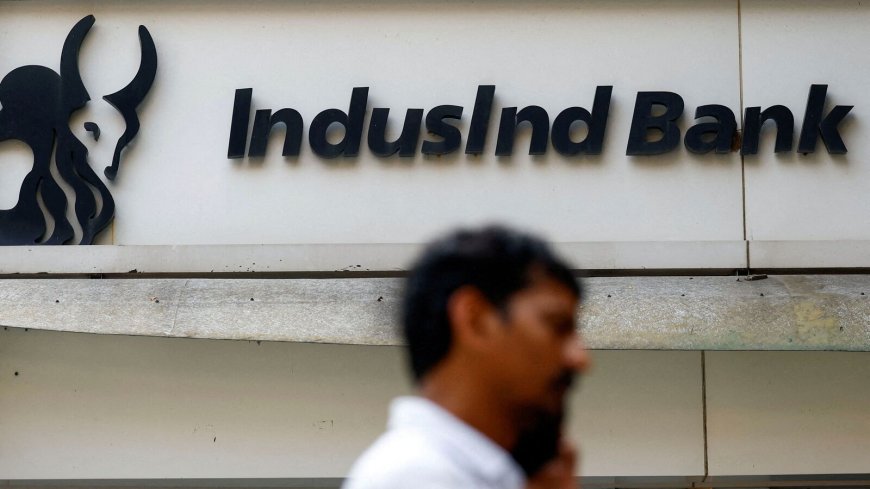IndusInd Bank Share Price Falls 6% Amid Fresh Accounting Issues; Brokerages Cut Ratings
IndusInd Bank shares fell 6% after revealing ₹674 crore in wrongly booked income. Investors react sharply as brokerages downgrade the stock. Here's what it means.

IndusInd Bank Share Price Tanks 6% as Accounting Discrepancies Emerge; Brokerages Downgrade the
Stock
IndusInd Bank, one of India’s major private-sector lenders, saw its share price nosedive by 6% in a single trading session following the revelation of fresh accounting anomalies in its books. The development, tied to irregularities in its microfinance loan segment, has not only rattled investor confidence but also triggered a string of downgrades from major brokerage firms.
With ₹674 crore wrongly recorded as interest income across three quarters of FY25, the reversal of this entry earlier this year has led to serious questions about internal controls and the bank’s accounting integrity.
What Happened: A Breakdown of the Discrepancy
IndusInd Bank’s internal audit team identified that an amount of ₹674 crore was incorrectly classified as interest income in the microfinance segment during the first three quarters of FY25. The mistake was corrected on January 10, 2025, by reversing the income entry entirely.
In addition to this, an amount of ₹595 crore under “other assets” had no supporting documentation. It was offset against "other liabilities" in the same quarter, raising further questions on the robustness of financial controls.
This marks the second such discrepancy in a short time frame for the bank, raising eyebrows among market participants and analysts alike.
Brokerages React Swiftly: Downgrades and Forecast Cuts
The market did not take kindly to the developments. A wave of downgrades followed:
CLSA
CLSA downgraded IndusInd Bank from "Buy" to "Hold," reducing its target price to ₹780. It noted that, when adjusted for the erroneously booked income, the bank's core Net Interest Margin (NIM) for the first nine months of FY25 would have been 17 basis points lower.
Investec
Investec took a firmer stance, cutting the rating from "Hold" to "Sell." It slashed the target price to ₹650 and expressed concern over "inconsistent and unclear financial reporting," particularly within the microfinance vertical.
Other Brokerages
Several other analysts issued cautionary statements, trimming FY25 and FY26 earnings estimates. A few even flagged potential valuation corrections if further clarity isn’t provided by the bank’s top management.
The Immediate Impact on IndusInd’s Stock
The news hit the stock price hard. IndusInd Bank opened the session lower and quickly lost over 6%, reaching an intraday low near ₹735 before recovering slightly.
For perspective, the stock has already declined over 24% in the past three months. This latest development added fuel to an already declining trend, with increased sell-side pressure from institutional investors.
Financial Metrics Affected
Beyond just the optics, these discrepancies have real implications for key financial metrics:
● Net Interest Margin (NIM)
The wrongly booked income inflated NIM, leading to potential misrepresentation in quarterly earnings reports. The adjusted NIM could be significantly lower, especially for the microfinance portfolio.
● Profitability
The ₹674 crore reversal in Q4FY25 directly impacted quarterly profits. Adjusted for this, analysts believe the Profit After Tax (PAT) figure for the fiscal may be overstated in earlier quarters.
● Book Value and Asset Quality
The ₹595 crore unsubstantiated entry in "other assets" also raises concerns about asset classification and the potential under-reporting of bad loans.
Management Under Pressure
These developments have further intensified scrutiny on IndusInd Bank’s leadership. The timing is particularly sensitive, as the bank is still recovering from leadership changes following the resignation of the CEO earlier this year.
The recurring nature of accounting lapses suggests not just oversight, but systemic weakness in internal controls. Shareholders are now demanding stricter governance measures and complete transparency.
Risk to Investor Confidence
Accounting errors in the banking sector carry significant risks, not only because they distort financial metrics but also because they erode investor trust. For a bank that relies heavily on retail and microfinance lending, any hint of misreporting can spook both retail and institutional investors.
The dual entry problems — both with income and asset balances — paint a picture of potential laxity in checks and balances, particularly in fast-growing lending segments like microfinance.
Analyst Forecasts and Valuation Metrics
Brokerages that once valued the stock with a Price-to-Book (P/B) ratio of 1.8–2.0 have now revised it down to as low as 1.2, in line with other stressed private sector banks.
FY26 EPS forecasts have been cut by up to 20% by certain analysts. A consensus seems to be emerging that unless the bank discloses more detailed reconciliation reports, valuations could remain subdued for the next two quarters.
What Lies Ahead?
Transparency Is Key
To regain lost ground, IndusInd Bank will need to:
-
Disclose more granular data on its microfinance portfolio
-
Detail corrective actions being taken internally
-
Possibly bring in a third-party forensic auditor
Regulator Involvement
There is growing speculation that the Reserve Bank of India (RBI) could ask for explanations or may initiate its own scrutiny. Past instances of accounting discrepancies in the banking sector have led to severe regulatory consequences, including penalties and operational restrictions.
Long-Term Impact on the Stock
From a technical analysis standpoint, the stock now trades below all key moving averages — 50-day, 100-day, and 200-day. This signals bearish momentum in the short to medium term.
Sentiment-wise, institutional funds that prioritize corporate governance will likely trim their exposure. Retail investors, already wary of financial stocks post-YES Bank and DHFL crises, are expected to remain on the sidelines.
Rebuilding Trust Is the Immediate Priority
IndusInd Bank finds itself at a critical juncture. What could have been a minor adjustment, if communicated transparently and proactively, has now escalated into a full-blown investor confidence crisis.
The bank must now work overtime to assure all stakeholders — investors, regulators, and clients — that it is committed to transparency and improved corporate governance. Until then, the stock is likely to remain under pressure.
What's Your Reaction?
 Like
0
Like
0
 Dislike
0
Dislike
0
 Love
0
Love
0
 Funny
0
Funny
0
 Angry
0
Angry
0
 Sad
0
Sad
0
 Wow
0
Wow
0












































































